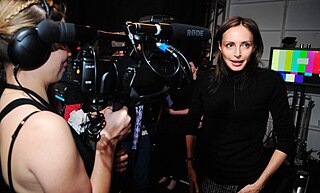Related Research Articles

Goth is a subculture that began in the United Kingdom during the early 1980s. It was developed by fans of gothic rock, an offshoot of the post-punk music genre. Post-punk artists who presaged the gothic rock genre and helped develop and shape the subculture include Siouxsie and the Banshees, Bauhaus, the Cure, and Joy Division.
In the United Kingdom, a Sloane Ranger, or simply a Sloane, is a stereotypical upper-middle or upper-class person, typically although not necessarily a young one, who embodies a very particular upbringing and outlook. The Sloane Ranger style is a uniform, effortless, and unambitious although sophisticated one. Its counterpart in the US is the preppy style and in France is bon chic bon genre.

Preppy, or prep, is an American subculture associated with the alumni of college-preparatory schools in the Northeastern United States. The term, which is an abbreviation of "preparatory", is used to denote a person seen as characteristic of a student or alumnus of these schools. Characteristics of preppy individuals include a particular subcultural speech, vocabulary, dress, mannerisms and etiquette reflective of an upper class and old money upbringing.

The Official Preppy Handbook (1980) is a satirical reference guide edited by Lisa Birnbach and written by Jonathan Roberts, Carol McD. Wallace, Mason Wiley, and Birnbach. It discusses an aspect of North American culture described as prepdom. In addition to insights on prep school and university life at socially acceptable schools, it illuminates many aspects of the conservative upper middle class, old money WASP society. Topics range from appropriate clothing for social events to choosing the correct college and major.

Youth subculture is a youth-based subculture with distinct styles, behaviors, and interests. Youth subcultures offer participants an identity outside of that ascribed by social institutions such as family, work, home and school. Youth subcultures that show a systematic hostility to the dominant culture are sometimes described as countercultures.

The modern social structure of France is complex, but generally similar to that of other European countries. Traditional social classes still have some presence, with a large bourgeoisie and especially petite bourgeoisie, and an unusually large proportion, for modern Europe, of farming smallholders. All these groups, and the remaining industrial working class, have considerable political power, which they are able to flex when required.

Dark culture, also called dark alternative scene, is a mixture of thematically related subcultures including the goth and dark wave subculture, the dark neoclassical/dark ambient scene, parts of the post-industrial scene parts of neofolk and the early gothic metal scene. Dark culture's origin lies in followers of dark wave and independent music, but over the decades it has developed to a social network held together by a common concept of aesthetics, self-representation, and individualism. The musical preferences of the dark scene are characterized by a mix of styles ranging from gothic metal, to industrial dance music and dark ambient, to dark neoclassical, neo-medieval and dark folk music, to gothic rock, dark wave and post-punk, the darker ends of electropop.

The fashion of the 2000s is often described as a global mash up, where trends saw the fusion of vintage styles, global and ethnic clothing, as well as the fashions of numerous music-based subcultures. Hip-hop fashion generally was the most popular among young people of both sexes, followed by the retro-inspired indie look later in the decade.
Alternative fashion or alt fashion is fashion that stands apart from mainstream, commercial fashion. It includes both styles which do not conform to the mainstream fashion of their time and the styles of specific subcultures. Some alternative fashion styles are attention-grabbing and more artistic than practical, while some develop from anti-fashion sentiments that focus on simplicity and utilitarianism.

The Gazette du Bon Ton was a small but influential fashion magazine published in France from 1912 to 1925. Founded by Lucien Vogel, the short-lived publication reflected the latest developments in fashion, lifestyle and beauty during a period of revolutionary change in art and society. Distributed by Condé Nast, the magazine was issued as the Gazette du Bon Genre in the USA. Both titles roughly translate as "Journal of Good Taste" or "Journal of Good Style."
BCBG may refer to:

Ivy League is a style of men's dress, also known as Ivy Style, popular during the late 1950s in the Northeastern United States, and said to have originated on college campuses, particularly those of the Ivy League. It was the predecessor to the preppy style of dress.

Street style is fashion that is considered to have emerged not from studios, but from the population at large. Street fashion is generally associated with youth culture, and is most often seen in major urban centers. Magazines and newspapers commonly feature candid photographs of individuals wearing urban, stylish clothing. Mainstream fashion often appropriates street fashion trends as influences. Most major youth subcultures have had an associated street fashion. Street style is different all around the globe.

Dominique Lavanant is a César Award-winning French film and theatrical actress. She is known for her comedy skills especially with posh and distinguished characters like Rosalind Russell's; characters often defined by the adjective BCBG, bon chic bon genre, and which refers to a particular stereotype of the French upper middle class – to be conservative in both outlook and dress.

Max Azria was a French-American fashion designer who founded the contemporary women's clothing brand BCBG MAX AZRIA. Azria was also the designer, chairman and CEO of the BCBG Max Azria Group, a global fashion house that encompassed over 20 brands. Azria left BCBG in 2016. BCBG Max Azria filed for bankruptcy in 2017 and was sold to Marquee Brands and Global Brands Group.

Lubov Azria is a Ukrainian-born American fashion designer. She was the Chief Creative Officer of BCBGMAXAZRIA Group, a global fashion house with over 20 brands.

Le Tout-Paris is a French expression referring to the stylish and affluent elite of Paris, who frequent fashionable events and places, and establish trends in upper-class culture. It is equivalent to the jet set elsewhere.
"Basic" is a slang term in American popular culture used pejoratively to describe middle class white people, especially women, who are perceived to prefer mainstream products, trends, and music. "Basic bitch" originated in hip hop culture and rose in popularity through rap music, songs, blogs, and videos from 2011 to 2014. The male counterpart can often be put under the "bro" label.
I.J.G.B. is a Nigerian slang term for a member of the upper classes that has just returned to the country after an extended period abroad. Its literal meaning is I just got back.
References
- ↑ Adeleye, Gabriel G. (1999). World dictionary of foreign expressions: a resource for readers and writers . Bolchazy-Carducci Publishers. p. 50. ISBN 9780865164239.
- 1 2 Hughes, Alexandra and Keith Reader (2002). Encyclopedia of Contemporary French Culture. Routledge. p. 54. ISBN 9780203003305.
- ↑ Alexiou, Joseph (2011). Paris for Dummies. John Wiley & Sons. p. 261. ISBN 9781118038741.
- 1 2 Fallon, Stephen (2010). Paris. Lonely Planet. p. 55. ISBN 9781742203980.
- ↑ Raissiguier, Catherine (1994). Becoming Women, Becoming Workers: Identity Formation in a French Vocational School. SUNY. p. 186. ISBN 9781438416762.